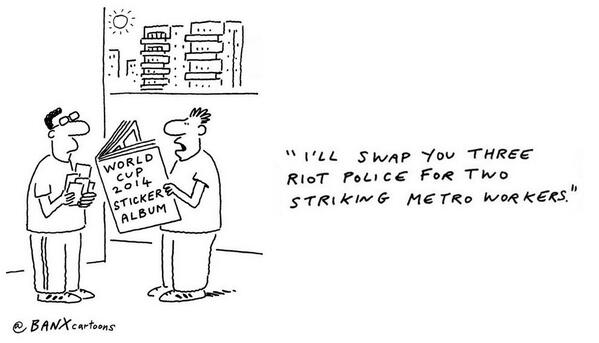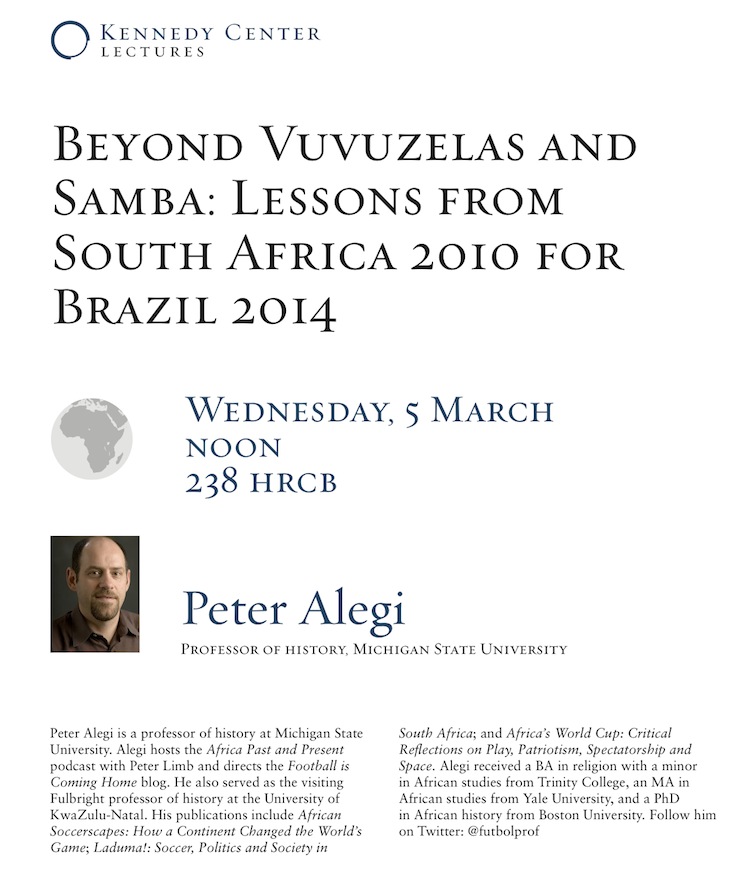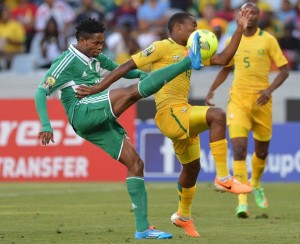The day before the magic kingdom opens in São Paulo, WKAR’s “Current State” host Mark Bashore interviewed me about the politics of the World Cup. We discussed FIFA profits and institutional reform, special World Cup laws and extraterritoriality, nation-building, development, civic protests, and what the future holds for Brazil, on and off the pitch. Originally broadcast live on June 11, 2014. Take a listen!

Tag: South Africa
I was recently interviewed by BBC Brasil‘s João Fellet and asked to compare the hosting of the 2010 World Cup in South Africa with the preparations for the 2014 World Cup in Brazil. Below is the Portuguese text of what transpired [translate] and a link to read the full article.
15 May 2014
BBC Brasil – Quatro anos depois da Copa de 2010, o que ficou do torneio para os sul-africanos?
Peter Alegi – Há um tipo de nostalgia por aquele período, por aquela sensação de unidade, solidariedade, de estar no centro do mundo. Os estrangeiros que foram para a Copa perceberam que os estereótipos negativos sobre a África do Sul não eram verdadeiros, e isso ainda faz o país se sentir bem. As emoções de um carnaval como a Copa são difíceis de bater.
BBC Brasil – Houve outros legados?
Alegi – O legado emocional foi importante de diferentes maneiras. Ele fez as pessoas sentirem um senso de unidade num país ainda muito dividido quanto a raças, classes e gêneros. Nos estádios sul-africanos, as pessoas cantam o hino abraçadas ou de mãos dadas, como nas igrejas. Num país onde o povo não tem muitas oportunidades de estar junto, a mágica do nacionalismo explodiu de uma maneira positiva.
Isso aconteceu só 16 anos após o apartheid. Sediar um evento bem sucedido fez com que os sul-africanos se sentissem muito orgulhosos.
O torneio também despertou sentimentos de panafricanismo. Por um ou dois meses, os sul-africanos se sentiram parte do continente africano. Isso foi encorajador, levando em conta os problemas do país com a xenofobia.

To read full article click here.
The Soccer Conclave
 There may not be any white smoke coming out of the soccer conclave this week at Hofstra University in New York, but little else will be missing from an unprecedented fútbological event featuring presentations by more than 100 scholars, journalists, authors, coaches, and the King of Soccer himself: Pelé.
There may not be any white smoke coming out of the soccer conclave this week at Hofstra University in New York, but little else will be missing from an unprecedented fútbological event featuring presentations by more than 100 scholars, journalists, authors, coaches, and the King of Soccer himself: Pelé.
Historians Brenda Elsey and Stanislao Pugliese are the presiding cardinals of Soccer as the Beautiful Game: Football’s Artistry, Identity and Politics , an international conference hosted by the Hofstra Cultural Center and the Hofstra Department of History. The gathering begins on Thursday, April 10, with concurrent panels, an opening ceremony, and two keynote addresses by David Goldblatt (“Brazil: The Curious Rise of the Futebol Nation”) and Jennifer Doyle (“Imagining a World Without a World Cup: An Abolitionist Perspective).
Friday’s menu serves up a plethora of panels on a dizzying range of topics and a ceremony honoring Pelé with the conferral of an honorary degree. Saturday’s focus is on journalists, coaches, philanthropy round-tables, followed by a concluding plenary session, and . . . a pickup game on the New York Cosmos home ground! (Note to self: remember to pack turf shoes.)
I’ll be presenting a paper comparing World Cup 2010 in South Africa to World Cup 2014 in Brazil (click here to listen to an earlier version of this talk) and also participating in the Football Scholars Forum on academic vs. journalistic writing about soccer (click here to watch my pre-conference video blog and here to read the other five posts by my fabulous co-panelists).
This is my video blog contribution to the Football Scholars Forum roundtable taking place on Saturday, April 12, 2014, at the global fútbological conclave known as the Soccer as the Beautiful Game conference at Hofstra University in New York.
These pre-conference blog posts are intended to launch the discussion about points of overlap and tension in the soccer writing of journalists and academics. Roundtable participants will share their insights on sources and methodologies, topics, audience, market logic vs. academic logic, and the role of digital tools in writing and dissemination.
The rest of the roundtable team is composed of Simon Kuper (Financial Times), Brenda Elsey (historian, Hofstra U.) Alex Galarza (Michigan State U.), John Foot (U. Bristol), and Grant Wahl (Sports Illustrated). To read their posts visit: http://footballscholars.org
Beyond Vuvuzelas and Samba
 Listen to “Beyond Vuvuzelas and Samba: Lessons from South Africa 2010 for Brazil 2014,” a lecture I delivered at Brigham Young University’s David M. Kennedy Center for International Studies on March 5, 2014.
Listen to “Beyond Vuvuzelas and Samba: Lessons from South Africa 2010 for Brazil 2014,” a lecture I delivered at Brigham Young University’s David M. Kennedy Center for International Studies on March 5, 2014.
The talk analyzes the political, economic, and cultural dynamics of the 2010 FIFA World Cup in South Africa and its similarities to the upcoming 2014 FIFA World Cup in Brazil.
Click here to watch the video.
South African Goals of the Season, 2011-13
Goals galore from South Africa, courtesy of MattMzansi’s YouTube channel. Because you can’t win if you don’t score.
 Guest Post by Liz Timbs (@tizlimbs)
Guest Post by Liz Timbs (@tizlimbs)
“We indeed have a crisis of monumental proportions. We don’t have a crisis of talent, we have a crisis of putting everything together,” thundered South African Sport and Recreation Minister Fikile Mbalula following South Africa’s 3-1 loss to Nigeria in Cape Town on Sunday, which eliminated the hosts from the 2014 African Nations Championship.
Mbalula publicly lambasted the national team, declaring that what he witnessed “was not a problem of coaching, it was a bunch of losers.” This “bunch of losers” and “unbearable useless individuals,” Mbalula continued, humiliated their country: “In Africa we have won nothing—we are the laughing stock. Even Madiba Magic would not have worked. This generation of players we must forget.”
Danny Jordaan, president of the South African Football Association and ex-CEO of the 2010 World Cup Local Organizing Committee, also criticized Bafana’s performance in the media, though in slightly less forceful terms than Mbalula. Jordaan saw the team’s elimination as an embarrassment, noting that SAFA had been “dismissive and even insulting to the quality of football on the continent.” He highlighted a deficiency in the “preparations, philosophy and technical staff.”
The reaction from Bafana Bafana head coach, Gordon Igesund, was decidedly tamer. “There are no excuses,” Igesund declared, “We lost to a better side . . . at the end of the day we have to look at ourselves and admit we were just not good enough even though we gave it our best shot.” Midfielder Siphiwe Tshabalala echoed Igesund’s understated honesty in his comments to the press. He apologized for the team’s debacle, adding that: “we are hurting and we know the nation is also hurting and we are not proud of not doing well but we just have to apply ourselves better in the future.”
Tshabalala and Igesund’s comments cut straight to the realities of why South Africa lost to Nigeria. Bafana certainly did not lose because goalkeeper Itumeleng Khune withdrew due to an ankle injury that threatened his participation in an upcoming Kaizer Chiefs league match against Mamelodi Sundowns. Let’s acknowledge the painful reality and move on: The South African national team is, at best, mediocre; we have to face this truth.
What makes digesting this bitter pill more difficult is that Nigeria did not even field her best team. The CHAN competition is limited to home-based players, which meant that Nigerians playing in European clubs were ineligible for selection unlike most Bafana regulars who ply their trade in the well-endowed domestic Premier Soccer League. Despite this apparent advantage, Bafana was no match for a team of young Nigerian players with limited experience in international competition. The visitors delivered three staggering blows and came close to a fourth before Bernard Parker scored a consolation penalty for the hosts.
Jordaan and Mbalula’s frustration with the national team is understandable. South African fans were frustrated watching the game. The problem is not that politicians and football officials were voicing their legitimate concerns, but rather the way in which they were framing these issues. These micro-level critiques, while useful in expressing frustration and releasing tension, are unproductive for getting to the root of South African football’s larger problems.
While not solely responsible, SAFA should be assisting in whatever way possible to develop talent at the grassroots level in order to eventually effect positive change at the highest level. Jordaan stated that SAFA is aware of the need for “big changes” at “grassroots level,” adding that “If we want to build a winning team for the future we have to have efficient structures in place right from school level.” Yet this vision is narrowly framed in terms of how this vaguely defined development would result in better showings by the senior national team.
Jordaan is right that grassroots development is desperately needed. But perhaps not in the ways he and others like Mbalula are suggesting. Mohlomi Maubane spoke to this important issue in a 2012 post on this blog. “SAFA’s understanding of the ‘bigger picture’ in domestic football is confined to four-year cycles for the men’s national team,” Mohlomi wrote. “But local football needs sound management, serious youth development for boys and girls, better coaches’ training, and infrastructural improvements at the grassroots.”
Using football as a tool for development not only helps to nurture athletic talent (as Jordaan noted) but also works to build healthy, productive members of society. As the remarkable work of Izichwe Football Club in Pietermaritzburg, KwaZulu-Natal demonstrates, this kind of development takes time, work, and resources. While the results won’t be seen right away, South African football can move forward through community-based, player-centered, long-term, sustainable approaches to youth and coaching development.
Minister Mbalula was correct in one regard: “We indeed have a crisis of monumental proportions.” Hopefully, the latest Bafana loss will inspire South African sport administrators and partners to invest the necessary resources and knowledge to go beyond crisis management and move closer to fulfilling South Africa’s great football potential.
*Liz Timbs is a PhD student in African history at Michigan State University. Her research interests are in the history of health and healing in South Africa; masculinity studies; and comparative studies between South Africa and the United States. Follow her on Twitter: @tizlimbs.